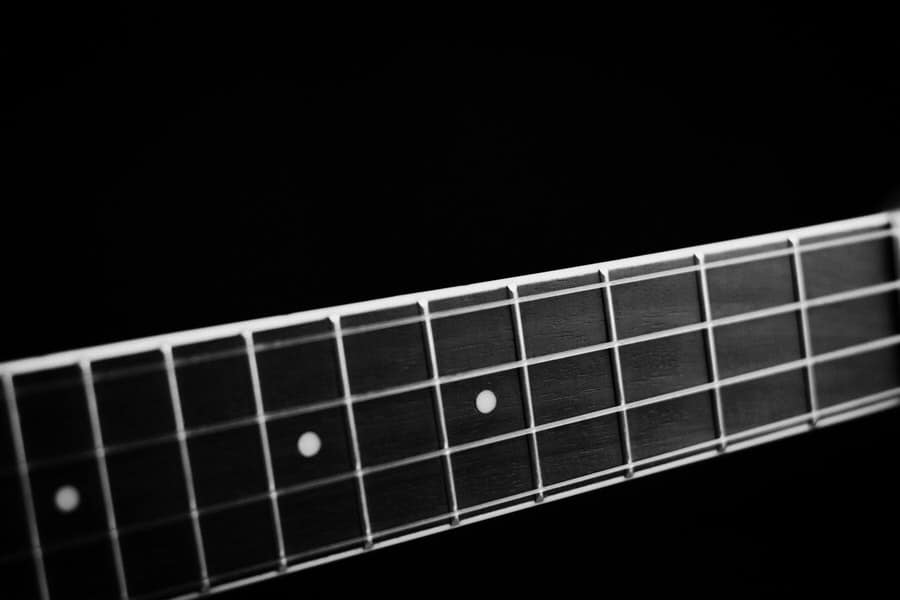Bass Guitar FAQ's
Frequently Asked Questions
We are confident that you have found the ‘Beginner’s Guide To Learning The Bass Guitar’ series to be helpful. It concludes with these Bass Guitar FAQs – and don’t forget to sign up for 4 Feature Friday…

Choosing An Instrument
Bass guitars aren’t as expensive as other instruments like violins or cellos. This means that you can expect to pay as little as $264 (£200) for a beginner bass, which is already set up according to industry standards. Or if you look hard enough you can find something for much less than that. Just remember to look for those that come from reputable brands, such as Ibanez, and Squier. Plus, when buying an instrument, try them out in person as much as possible, so you can feel how they handle.
Since a bass guitar is as ubiquitous as an electric or acoustic guitar, ideally, you should have your own because they’re not too expensive in the first place. But if buying is still out of the question, then you can easily borrow one from someone you know or rent an instrument out from the nearest music store that offers rentals. However, if you want to improve quickly, you will need to practise at home, and that means having your own bass is the most ideal option.
Bass guitars vary so much in terms of price and quality. So to make things easier, set your budget and go from there. Beginners should also take into account their skill and dedication level. Because if you’re really unsure whether you want to learn bass in the first place, then you shouldn’t spend exorbitant amounts of money for your first one. Choose an instrument that fits your personal preferences, and make sure that it will last you for a while.
Used bass guitars are a dime a dozen. You can check out online marketplaces and there would be scores of used basses on sale. But before you go choosing which one you like the most, make sure that it’s well-maintained, has complete accessories (an amplifier, a cable, a strap, and a few pedals if available), and from a reputable brand. All you need to do is ask the seller for these details before coming to a deal.
Maintenance
Bass strings are thicker and tougher than that of a guitar, so they won’t need replacement for a long while. You can keep the ones that your bass came with for years without even having to replace them, unless, of course, you’re not that good at maintaining them yourself. But it all depends on playing habits and whether or not you’re a good steward of your instrument: a player with regular playing habits is advised to change strings every 2 to 4 months. That is the baseline frequency, but you can go for a bit longer if you know how to take care of your strings.
Bass strings are durable and barely snap, but they can still lose a lot of their sound quality due to built-up oil and dirt in the grooves. You can remove all that gunk by a few simple home methods. For instance, a lot of bass players swear by boiling the strings in water. You can also soak them in denatured alcohol, which is one of the more popular methods of cleaning the strings. In fact, denatured alcohol is better because water can cause rust buildup on the strings over time. But at the end of the day, it’s still your choice. Or if you want to keep things simple, why not invest in a specialist instrument cleaning kit.
Technique
Like any other instrument, the bass benefits from constant practice. The more you practise, the faster you’ll improve. It is critical that you practise at least every day, no matter how long the session is. Even a quick 5-minute season is enough for your mind and body to acclimate to new concepts and master old ones. But the most ideal should be at least 30 minutes every day, to allow time for muscle memory to solidify and your mind to be more acclimated to the thought and feel of playing.
It depends, but with regular lessons or constant self-instruction and practice, you can play the simplest songs in only a few weeks. But that’s only the tip of the iceberg. There is a chasm of difference between good and great bass players, and you’ll only be considered great if you have a certain level of proficiency and musicianship on the instrument. You can only achieve that if you practise constantly for several years. There are some genres that require more work, however, like jazz, due to their complexity.
A lot of bass players around the world, especially several of the best ones, swear by playing with only their fingers. In fact, they even say that playing bass with a pick is inconvenient and downright disrespectful to the craft. Though it is important to remember that plucking with your fingers is the universally accepted method, since it allows for more versatility than holding a pick and plucking one string at a time. The best thing about playing with your fingers is the bassier, fuller tone compared to the thinner, metallic tone of using a pick.
Bass slapping is a technique very popular in funk. In truth, it’s a very unique (and amazing way) of hitting the strings instead of plucking them. You literally slap the bass strings with your thumb which gives the bass a “funkier”, sort of percussive sound, for the lack of a better term. Like any other bass playing technique, however, this requires a lot of work and mastery to get right. So if you want to learn how to slap bass, get to practising!
Slap pop is a technique which involves slapping (like the previous one we talked about) the strings with your thumb instead of plucking them, then making them “pop” with your other fingers. You do the popping thing by putting your finger underneath the string, pulling it outward, then letting it snap back to place, which creates a popping sound. You can do this by combining your arm and wrist in a smooth rotation to produce the effect. It’s a hard technique to master, and definitely not for beginners to try until they’ve mastered all the basics down!
About the Author
Hugh Richardson
You can find out more about Hugh from www.onlinebassguitar.com
General Bass Guitar FAQs
Some people (even some guitarists) think that playing bass is easier because it has, on average, 2 less strings than a guitar (4 vs 6). But that’s simply untrue. The ease of learning an instrument depends entirely on your practice habits and.or how good your instructor is at laying down the necessary musical foundations. The fun with learning bass, however, lies in its simplicity and complexity: you can play with a band even if you can only play the simplest basslines. And when you improve, that’s where you move on to funkier, more complex ones.
Age is never a problem when learning the instrument! Even children under ten years old can learn the bass as well as 60-year-old adults! All that matters is whether you really have a passion for learning the bass, and if you have the dedication to work on your craft and eventually be the best you can be at it. Because you can have the talent and musicality at first try, but if you don’t have the dedication to get better, even then, your age still doesn’t matter!
The simplest answer is this: there are so many guitarists out there but not a lot of bassists. And the bass itself is considered a critical part of every piece of music out there, be it classical, pop, or rock. Bands will never run out of guitarists to pick from, but bassists are less common considering their importance. Plus, there is a sense of amazement and fulfillment in playing those low notes that you will never get from a guitar.
The typical four-string bass might not be, but the bass itself in general can be a good solo instrument if you are good enough at it. Think about an 8-string bass 0r even 12-string bass, which allows you to reach notes that even guitars can reach! This allows for more showmanship and technical wizardry than if you’re playing a four-string. But that doesn’t mean you can’t play amazing solos on a 4-string, either. It all depends on your level of mastery and proficiency with the instrument. And if you are really good at the bass, then it can be fun to play solo!

Join Up To Get The 4 Things I’ve Been Loving, Using and Reviewing
4-Feature Friday does just what it says on the tin; sends an email every Friday with four of the most amazing things I’ve found that week
The e-mail really can be about anything; ebooks, tunes, tracks, cool gadgets, training tips – provided that it’s fun and intriguing and excellent, it’ll end up on the email!
Receive access now by clicking below:




